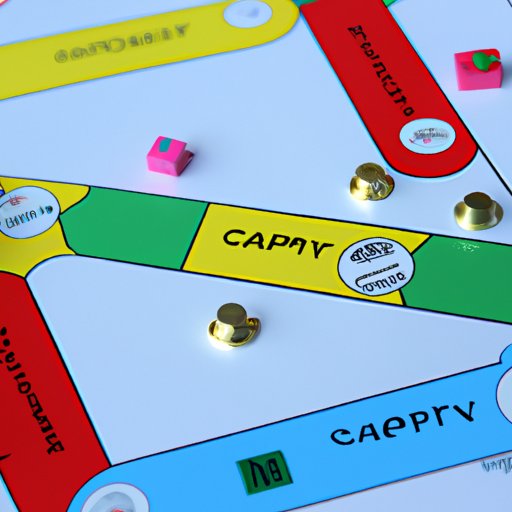
I. Introduction
Welcome to the world of Monopoly! One of the most popular board games of all time! Whether you are a seasoned player or you have just started getting into it, understanding the starting capital is essential. Knowing the initial amount of money you receive at the beginning of the game can determine your gameplay strategy. In this article, we will explore how much money do you start out with in Monopoly, its importance, and how to maximize your potential with it.
II. Monopoly: A Beginner’s Guide to Starting Capital
Monopoly is a board game that involves buying, trading, and developing properties around the board while trying to bankrupt your opponents. The game is played with a pair of dice, and players move around the board according to the number that appears on the dice. Each player starts the game with an initial amount of money that determines their buying power throughout the game. Starting capital plays a significant role in Monopoly and can make or break the game.
III. Starting Out Strong: Understanding the Initial Funds in Monopoly
The standard starting capital in Monopoly is $1500. The amount is divided by several denominations, including $500, $100, $50, $20, $10, $5, and $1. Players receive two $500 bills, two $100 bills, two $50 bills, six $20 bills, five $10 bills, five $5 bills, and five $1 bills. The starting capital is the same for each player in the game, ensuring a level playing field. Some versions of Monopoly may have different starting capital, such as the Junior or Electronic versions.
The difference in starting capital can also change the game’s length and overall strategy. Games with higher starting capital tend to last longer, while games with lower starting capital may have shorter gameplay.
It’s important to consider the starting funds before choosing which game to play. A higher starting capital may be better for extended gameplay and more property development, while a lower starting capital may lead to faster and more aggressive gameplay.
IV. The Economics of Monopoly: How Much Starting Money Makes a Difference
The starting capital in Monopoly affects the game’s economics significantly. The amount of starting funds directly influences the player’s buying power and ability to purchase properties. It can also change the player’s strategy, as a higher initial amount provides more flexibility.
Having more cash at the start of the game can give players an advantage, allowing them to buy more properties, pay rent without selling properties, and build houses and hotels. A player with higher starting capital is more likely to have a stronger position later on in the game.
On the other hand, players with lower initial funds may have a more challenging time purchasing properties and paying rent, leading to a more aggressive gameplay style. In these cases, players must strategize to stay in the game before building up their cash reserve.
V. Maximizing Your Monopoly Potential: Making the Most of Your Starting Funds
To maximize your starting capital, it’s important to have a strategy in place before starting the game. The first step is to prioritize spending in the early game. Start by investing in properties with high rental costs, such as the orange and red properties. Also, focus on acquiring monopolies, which can help you corner the market and create a steady flow of cash.
Another important strategy is to manage your money and avoid wasting it on luxury purchases that don’t generate income. When starting the game, avoid paying too much for utilities and railroads, as they do not produce a substantial rental income. Instead, focus on properties that can generate frequent rent payments.
VI. Monopoly Strategy 101: Using Your Starting Funds to Dominate the Board
The starting capital in Monopoly can significantly affect your gameplay strategy. If you’re starting with more money than your opponents, focus on building up your reserve by investing wisely and holding onto your cash as much as possible. This strategy can help you avoid foreclosures and bankruptcies.
If you have less starting capital than your opponents, you’ll have to take a more aggressive approach. Start by trying to acquire monopolies, then invest your money in the properties and make it hard for your opponents to move around the board. Another strategy is to buy up all the cheap properties and increase their value by building houses and hotels, making them more valuable.
VII. Monopoly for Kids: Teaching Young Players About Starting Funds and Financial Literacy
Monopoly is a great way to teach kids about financial literacy and the importance of managing money. Using the starting capital as a guide, parents can teach their children about budgeting, investing, and spending. By playing Monopoly, children learn how to weigh the pros and cons of each purchase, negotiate and trade with other players, and identify good investment opportunities.
Parents can also use Monopoly to teach basic math skills by having their children do the math while playing the game. This can be a fun way to teach math skills while playing a game.
VIII. Conclusion
In conclusion, understanding the starting capital in Monopoly is crucial. The amount of initial funds you receive significantly affects your gameplay strategy and fundamentally changes the dynamics of the game. By carefully managing your starting funds and developing a winning strategy, you can emerge as the most successful player.
By following the tips and strategies outlined in this article, you can maximize your Monopoly potential and teach your children financial literacy skills.




